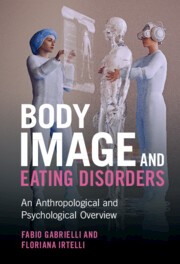Book contents
- Body Image and Eating Disorders
- Body Image and Eating Disorders
- Copyright page
- Contents
- Acknowledgments
- Part I Contemporary Perspectives in Anthropology, Philosophy, and Psychology on the Human Body: An Introductory Overview
- Part II Brain without Body, Body without Brain, and Contemporary Body Image Disorders
- 2 Body Schema, Body Image, and Hypermodern Alterations
- 3 Alexithymia and Somatizations
- 4 The Myth of the Perfect Body Image, Body Dysmorphic Disorder, and Bigorexia
- 5 The Complex Relationship between the Mind, the Body, and the Contemporary Environment
- Part III The Hypermodern Contradictory Relationship with Food
- Part IV Which Possible Horizons? Some Final Considerations
- References
- Index
2 - Body Schema, Body Image, and Hypermodern Alterations
from Part II - Brain without Body, Body without Brain, and Contemporary Body Image Disorders
Published online by Cambridge University Press: 26 May 2022
- Body Image and Eating Disorders
- Body Image and Eating Disorders
- Copyright page
- Contents
- Acknowledgments
- Part I Contemporary Perspectives in Anthropology, Philosophy, and Psychology on the Human Body: An Introductory Overview
- Part II Brain without Body, Body without Brain, and Contemporary Body Image Disorders
- 2 Body Schema, Body Image, and Hypermodern Alterations
- 3 Alexithymia and Somatizations
- 4 The Myth of the Perfect Body Image, Body Dysmorphic Disorder, and Bigorexia
- 5 The Complex Relationship between the Mind, the Body, and the Contemporary Environment
- Part III The Hypermodern Contradictory Relationship with Food
- Part IV Which Possible Horizons? Some Final Considerations
- References
- Index
Summary
It is only in the last few years that some factors, such as the spread of eating disorders, closely related to bodily experience, have prompted researchers to a greater systematization of theory: in summary it is a scientific process which has led to the inclusion of all the perceptual, affective, and cognitive representations of the human body in two basic, intertwining concepts: body schema and body image. The body image is also generated and reorganized because of external stimuli. This process takes place on various levels: emotional, imaginary, sensory, and creative. The analysis of body image is therefore not a neurological issue, but a psychological one. In recent decades, scientific research has attached increasing importance to the interactive and relational components of the subject's psychological experience: it is not only intimate relationships that can affect human perceptions but also the wider social environment, such as the mass media, which reinforce beauty ideals or elicit changes in the way people perceive their own appearance and influence perceived norms.
- Type
- Chapter
- Information
- Body Image and Eating DisordersAn Anthropological and Psychological Overview, pp. 27 - 41Publisher: Cambridge University PressPrint publication year: 2022

